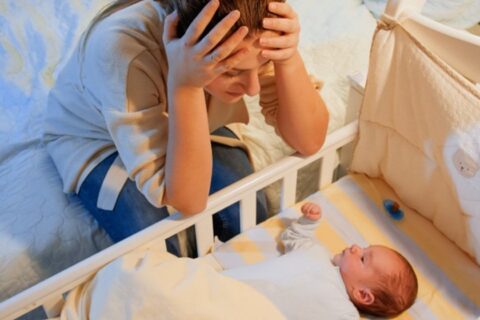COVID-19 Precautions for Pregnant and New Moms
If you are pregnant, breastfeeding, or caring for a newborn baby, you probably have many questions about coronavirus and pregnancy. There are many things we don’t yet know about COVID-19, but we’re learning more each day. While it currently remains unclear if coronavirus is worse for pregnant women, pregnant women do tend to have more problems with other respiratory viruses, like the flu. For this reason, it’s especially important to follow all recommended precautions while pregnant.
So how can pregnant women and new moms protect themselves from coronavirus? Here are some COVID-19 precautions that pregnant women and new moms should take.
First Things First…
Take the same COVID-19 precautions as everyone else – There is nothing about pregnancy itself that makes a woman more susceptible to being infected, so they should follow the same guidance as everyone else. This includes proper handwashing (at least 20 seconds using warm water and soap), not touching your face, nose, eyes or mouth and following aggressive social distancing (not going out unless you absolutely have to and staying six feet apart from others.)
Actions to Take if You Are Pregnant
Talk with your provider about your birth plan – Most experts believe that a hospital or a hospital-based birth center is still the safest place to give birth. This environment ensures access to necessary care in cases of unanticipated complications, which can happen even in the healthiest pregnancies. Also, many hospitals are adjusting policies to limit exposure risks during the pandemic, such as limiting the number of people who can be in the room during delivery.
Do not skip your prenatal care appointments – Talk to your healthcare provider about how to stay healthy and take care of yourself during the COVID-19 pandemic. It’s good to limit your interactions with other people as much as possible. However, do not skip your prenatal appointments. (Information for how to protect newborns from becoming sick with COVID-19 while in the hospital can be found in CDC’s Considerations for Inpatient Obstetrics Healthcare Settings.)
Know what to do if you think you have COVID-19 – If you think you may have been exposed to the coronavirus and have a fever or cough, call your healthcare provider within 24 hours. Symptoms to watch out for include a hard time breathing or shortness of breath that is more than what has been normal during your pregnancy, ongoing pain or pressure in your chest, blue lips, confusion or inability to respond to others.
Get screened for COVID-19 before delivery – It is now recommended that all pregnant patients be tested for coronavirus when they arrive for delivery. This is to both inform what kind of personal protection equipment providers will need as well as caring for moms and babies, along with public health reasons.
Cope with stress – You may feel increased stress during this pandemic. Fear and anxiety can be overwhelming and cause strong emotions. Learn about stress and coping, and also find out more about how to reduce your risk of getting COVID-19. When in doubt, call your healthcare provider if you have any questions related to your health, and seek care immediately if you have a medical emergency.
Ways to Protect Your Infant From COVID-19
Stay away from sick people – Because newborns’ immune systems are still developing, they have a harder time-fighting illness. So it’s important to take special COVID-19 precautions when your baby comes home from the hospital. Keep your baby away from anyone who is sick.
If someone in your home is sick, take all recommended precautions to protect your baby.
Keep practicing social distancing – Keep your baby at home and away from others as much as possible. Don’t have friends and family over to meet the baby yet, and don’t take the baby to other people’s homes. Keep away from others as much as possible by staying home. If you have to take your baby out — for instance, to a doctor’s visit — keep yourself and your baby at least 6 feet away from other people.
Stop the spread of germs – Be sure to always wash your hands before and after touching your baby. The same should go for any and all caregivers. Also, use hand sanitizer with at least 60% alcohol. Try not to touch your baby’s eyes, nose, and mouth. Keep all surfaces clean. Plus, clean and disinfect things that people touch a lot, like phones, doorknobs, and pacifiers.
Practice safe breastfeeding – You should continue to breastfeed your baby as your baby will gain antibodies and key nutrients from breast milk. However, do refrain from taking breast milk from any unknown donors. Also, a mother with confirmed COVID-19 should take extra precautions like wearing a face mask while feeding.
Do not use infant face shields – Not only is there no data supporting the use of infant face shields for protection against COVID-19 or other respiratory illnesses, but an infant face shield could increase the risk of sudden infant death syndrome (SIDS) or accidental suffocation and strangulation. Therefore, plastic face shields for newborns and infants are NOT recommended.
Stay up to date – The CDC and American College of Obstetricians and Gynecologists both currently recommend that pregnant women follow the same precautions as others in their communities.
To protect themselves from coronavirus and other infections, pregnant and new moms should get updated Information on COVID-19. Check the Centers for Disease Control (CDC) and World Health Organization (WHO) websites for up-to-date, reliable information about coronavirus.
Until You Get Through This, Count On Our Support
In uncertain times, you need to be able to turn to experts who understand and can help strengthen your health and well-being. Brevard Health Alliance is here for you. We offer OB services and we’re committed to helping you protect yourself, your baby, and your family during the COVID-19 pandemic. Read more about our women’s health services, or click here to schedule a virtual visit.COVID-19 Precautions for Pregnant and New Moms



















































































































































